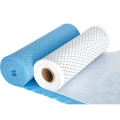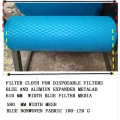In today's rapidly evolving industrial landscape, the demand for superior air quality and process purity is paramount. At the heart of achieving these critical objectives lies advanced filter media. These engineered materials are not merely components; they are the fundamental guardians of equipment longevity, product integrity, and human health. From protecting sensitive machinery from particulate contamination to ensuring sterile environments in pharmaceutical production, the performance of filtration systems directly impacts operational efficiency, regulatory compliance, and overall profitability.
Current industry trends highlight a significant shift towards higher efficiency, greater sustainability, and more specialized filtration solutions. Companies are actively seeking filter media that offer extended service life, reduced energy consumption, and superior performance under extreme conditions. Innovations in materials science are leading to the development of sophisticated nonwoven synthetic filter media, which provide enhanced dust holding capacity and lower pressure drop compared to traditional materials. Furthermore, the increasing awareness of airborne pathogens and fine particulate matter (PM2.5) has accelerated the adoption of high-performance options like hepa filter media in an expanding range of applications. The market for filter media for sale is robust, driven by these continuous technological advancements and stringent environmental regulations.

The drive for advanced filtration solutions extends beyond particulate removal. The need to combat volatile organic compounds (VOCs) and hazardous gases has brought activated carbon air filter media to the forefront, offering effective adsorption capabilities crucial for air purification in industrial and commercial settings. This comprehensive approach to filtration underscores the critical need for well-engineered filter media solutions that cater to the diverse and complex demands of modern industries.
The manufacturing of high-performance filter media, such as the Laminated Air Filter Media With Mesh, involves a meticulously controlled process designed to achieve specific filtration efficiencies, dust holding capacities, and pressure drop characteristics. This process begins with material selection and progresses through various stages of formation, treatment, and quality assurance.

This critical initial step involves selecting high-quality synthetic fibers, typically polyester or polypropylene, for the nonwoven synthetic filter media component. These materials are chosen for their intrinsic properties such as chemical resistance, thermal stability, and mechanical strength. For activated carbon air filter media, high-purity activated carbon granules are prepared. Additionally, a reinforcing mesh material, often expanded metal or plastic, is selected for structural integrity.
Synthetic fibers are spun using processes like melt-blown or spun-bond techniques. Melt-blown technology produces very fine fibers, enhancing filtration efficiency, while spun-bond creates stronger, more uniform webs. These fibers are then laid down randomly or in an organized pattern to form a coherent nonwoven web. This web's density, thickness, and fiber diameter are precisely controlled to achieve desired filtration characteristics, including specific MERV (Minimum Efficiency Reporting Value) ratings.
Depending on the application, the nonwoven web may undergo various treatments. This can include heat setting to stabilize the fibers, chemical treatments for enhanced hydrophobicity or antimicrobial properties, or impregnation with activated carbon for gas phase filtration (as in activated carbon air filter media). These processes are crucial for optimizing performance and extending service life.
The treated nonwoven filter media is then laminated, typically using thermal bonding or adhesive bonding techniques, with the chosen reinforcing mesh. This lamination provides crucial structural support, preventing media sag or collapse under air pressure, especially in pleated filter designs. The mesh ensures the media maintains its shape and integrity throughout its service life, contributing to consistent performance.
The laminated media rolls are precisely cut and slit into specified widths and lengths, ready for further processing into finished filters. CNC machining is often employed here to ensure high precision and minimize material waste.
Rigorous testing is performed at various stages. Finished filter media undergoes comprehensive performance testing for parameters such as initial pressure drop, dust holding capacity (DHC), and filtration efficiency according to international standards like ISO 16890, ASHRAE 52.2 (for MERV ratings), or EN 779. Burst strength, air permeability, and uniformity are also evaluated. Compliance with standards such as ISO 9001 for quality management ensures consistent product quality and reliability.
The final product, whether in rolls or sheets, is carefully packaged to prevent contamination and damage during transit, ready for distribution to filter manufacturers or end-users seeking filter media for sale.

This meticulous process ensures that each batch of filter media meets the stringent performance requirements for its intended application, providing long service life and reliable filtration.
Thickness:0.2-6 mm or Customized
Strand Thickness:0.5-8mm
Swd:2.5-100mm Lwd: 4.5-200mm
Surface Treatment:Powder Coated,Galvanized
MATERAL: PHENOLIC PAPER
MELT-BLOWN PBT
NON-WONEN LAMINATES
DIESEL FUEL FINE FILTERATION GRADE
APPLICATION : FUEL OIL WATER SEPERATION FILTER MEDIA
Material: Electrostatic cotton with activated carbon
PET/PP with Activated Carbon
Basic weight: 200-800g/m2
Application: Cabin Air Filters Panel Air Filters, Filter Cartridge, etc.
RAW MATERIAL: Polypropylene
PROCESS TECHNOLOGY: Melt-blown non-woven
RANGE OF EFFICIENCY: M5 ~ H11
Email to this supplier

